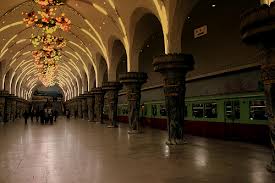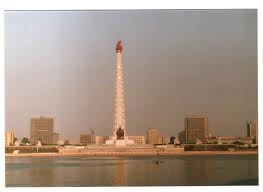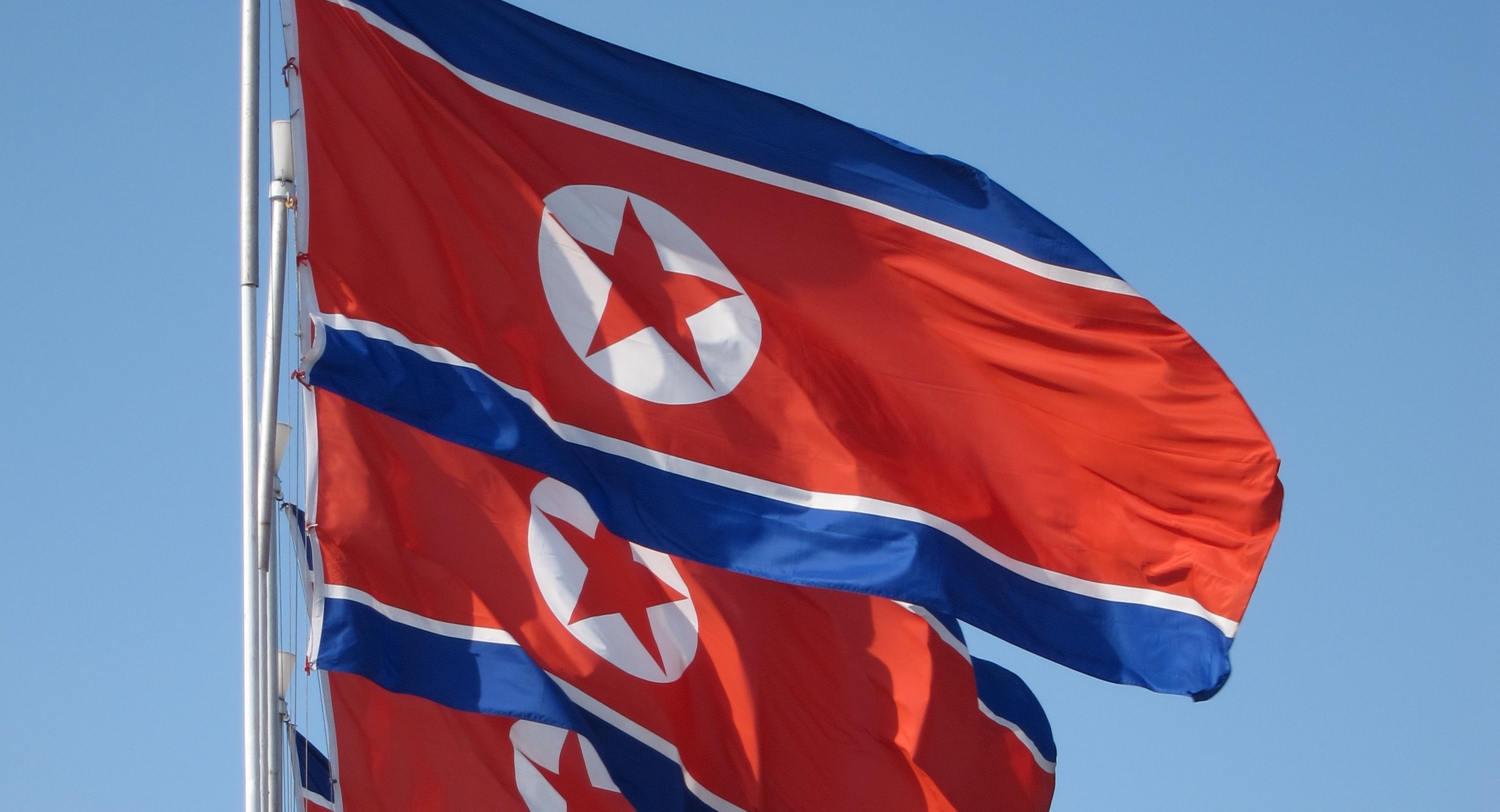A wispy layer of fog lay over seemingly endless rice paddies in the valley where Pyongyang Sunan International Airport is situated. Air Koryo flight JS 156 was a short one, in the air a mere forty-three minutes. However, those forty-three minutes proved to be more than enough to repeatedly question what I had gotten myself into. The plane jerked as it touched down on the Cold War-era dirt stained tarmac, jolting me back into reality: I was now on the ground in the world’s most isolated state, North Korea. As the plane crossed the tarmac, I caught my first glimpse of the dear leaders Kim Il Sung and Kim Jong Il, their portraits perched high on the wall of the terminal. The West has latched onto the idea of North Korea as a ‘cult of personality’ political system where the leaders are more or less worshipped and seen as infallible. North Korean citizens are then casually compared to the flying monkeys from the Wizard of Oz; they are imagined to be evil, brainwashed and cartoonish. The ease with whic h humans cast something different as crazy and absurd is frightening.

Possibly more alarming, though, are the assumptions we create about the unknown. During the Age of Exploration, fearsome stories of giant sea monsters scared children all across Europe. In the early 2000’s, the potential existence of weapons of mass destruction in Iraq excited the emotions of the most intelligent policymakers in Washington, resulting in a full-fledged war. Today, the Democratic People’s Republic of Korea is the unknown with which the West is obsessed. Of course certain assumptions about the DPRK are warranted: they do possess nuclear weapons, their political system is autocratic and their society is Communist. Unfortunately, these assumptions have been extended to dehumanize the country’s citzenry, casting North Korean people as cartoon characters rather than rational human beings. Of course the DPRK has problems that must be addressed, just as we do at home in the United States – human rights and foreign relations being the most glaring. But the solution to the country’s problems is not aggressive, threatening or condescending policies such as the ones currently pursued by the American-led bloc of the international community. These only serve to further isolate the North and perpetuate feelings of disgust for the West, while causing the most harm to innocent civilians who suffer the effects of a sanctioned economy.
Perhaps the most memorable feeling I brought back from my time in the Hermit Kingdom, though, is that there is hope. Once removed from Western propaganda and detached, as well as I could be, from my inherently pro-American world view, I was able to appreciate North Korea for what it is: a nation of strong, triumphant people with an ancient culture who wish to retain their “Korean-ness.” Trying to resist Western cultural imperialism has landed them in the Axis of Evil, ostensibly an enemy of the civilized world.
Personal anecdotes do abound of inept border patrol agents, rural poverty, and Communist social restrictions, though. While traveling along a highway to the eastern city of Wonsan, our group was reported for taking suspicious photographs of military members, resulting in an inspection of our cameras. Crossing the border between the DPRK and China, my traveling companion had no problem getting through customs even though he identified himself as “Batman” and stated that he was traveling with “The Justice League” on his immigration documents. However, for each of these stereotypical instances of North Korean ineptitude and backwardness, I also had encounters that completely surprised me because of how human the people seemed.
One such encounter occurred while on a beach near the industrial port city of Hamhung. There, I met a group of working class people enjoying an afternoon at the ocean. The men played cards and tended to the boombox while the women huddled around a rectangular piece of sheet metal roughly the size of a queen sized bed, cooking all sorts of traditional Korean dishes. Both the men and women were laughing and carrying on with unexpected joy for people in such an oppressed society. I ventured over to say hello and was welcomed with open arms and armfuls of food. Eventually I ended up dancing with them. Needless to say, I learned my fair share of pretty hip North Korean dance moves. The warmth with which I was received at this private beach party surprised me. These types of gatherings were happening up and down the beach, each group having the greatest time escaping the banality of everyday life. On this shoreline, the conception that all North Koreans harbor ill will towards foreigners, especially Americans, could not have been further from the truth.
Later in the evening some of the women actually talked with me about America. It was not the classic third-world-meets-first-world conversation with questions about how much better life in America is. Instead, it was a fairly intelligent discussion about relations between our two countries. These ladies were keen to misconceptions of their country in American government and media, asking why they existed. I found it difficult to answer their question for, in this moment, it seemed ridiculous to claim that America’s intimidating, offensive foreign policies towards the DPRK were positive actions taken in the name of self-defense. Feelings of insecurity are warranted for North Korea, a country constantly threatened by foreign influences and pressure for the past two centuries. But for America, acting fearful of the DPRK seems like little more than an excuse for expanded influence.
A few days later, I engaged in similar conversation with several military members at multiple posts along the demilitarized zone (DMZ). The DMZ surrounds the line of demarcation between North and South Korea, offering a buffer space between the two states. In one instance, a colonel general of the Korean People’s Army (KPA), the equivalent of a lieutenant general or vice admiral in American military ranks, found out I was from America and surprised me with a wide smile. He proceeded to tell me that Korea does not hate America, and that its policies are not truly belligerent or militaristic. The rhetoric espoused by the foreign ministry, he said, is best understood in terms of defense. Puffing out their chest, according to this officer, is meant as a scare tactic to deter violence towards them since they know that another war on the peninsula would be disastrously costly.
At Panmunjom, the UN-DPRK joint security area on the DMZ, another member of the KPA and I sparked a conversation. When he found out that I was American, he grabbed me around the waist and pulled me close. Wagging a finger in front of my face, he said, “Koreans and Americans are not enemies. Our governments do not get along, but we like you. [You’re] good people. It’s sad that our governments fight.” Contrary to popular belief, the people of Korea are not all brainwashed to hate the West – even those in the military, who should be the most nationalistic members of society.

Of all my experiences in this peculiar place, the most extraordinary was July 27, Victory Day. This year is the 60th anniversary of the Korean War – or as it is referred to in the North, the Fatherland Liberation War. Images in Western media of these massive military parades skew the reality of the event. They are portrayed as exemplifying a combative militaristic society with a reverence for their god-like leaders that leads them to wail in the streets, overcome with irrational emotions. I encountered none of this. The parade I experienced was eerily similar to military airshows on the Fourth of July; ordinary citizens venturing out to show their support for their nation’s servicemen. In any society, nationalism and support for one’s military is inevitable.
However, being part of a flag-waving crowd excitedly showing their support for a nation that is labeled as a threat to my own was bizarre. The hate and contempt North Korean people supposedly felt towards the outside world was nowhere to be found. The atmosphere was encouragingly positive and light, happy even. For this day, North Koreans could put aside their shameful past and proclaim their national pride.
Contrary to predictions that the North would collapse after the war and every attempt by the international community to bring this to fruition, the state persists. The North Korean people have endured unimaginable hardhips – Japanese occupation, war, foreign pressure, a terrible famine – and yet they carry on. They have displayed admirable strength and, yet, they receive no respect from the West. Favoring disrespectful, cartoonish representations of the Korean people makes America partially responsible for the injustices done to them. The foundation of cooperation and peace between our two countries must be built on mutual respect and understanding. Without this the North Korean quagmire is destined to persist, perpetuating the same poverty and human rights issues we are trying to get rid of in the peninsula.

Fascinating article.
If I might ask, though, how do you regard South Korea in perspective? As a Western puppet that has surrendered its national dignity?
Awesome perspective, thanks for sharing! We all just need to chill out and remember we’re all human sometimes 🙂